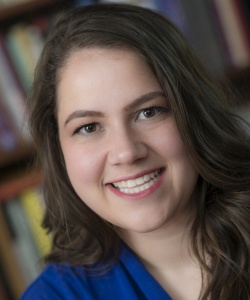Thank you for your positive feedback on our staff spotlight series! This month, we’re excited to feature Anna Flaming, assistant provost for teaching and learning and director of the Center for Teaching.

Anna provides vision and leadership for the center, guiding the team in developing programs that support excellence in teaching and learning across campus. She works closely with faculty, staff, and university leaders to foster a culture that values innovative and evidence-based teaching practices. She has served on several institutional boards and committees, including the Teaching Effectiveness Task Force and the Excellence in Teaching and Learning Network. Anna is a founding member of the Provost’s Task Force on First Generation College Students, which is now known as the 1stGen@Iowa Faculty & Staff Collaborative.
Her work has appeared in several higher education publications, and she is currently part of the editorial team of To Improve the Academy: A Journal of Educational Development. You might see Anna at Center for Teaching events and other meetings related to student and faculty success. She loves talking with instructors, so stop by and say hello! Until then, read on to learn more about Anna’s work and her favorite thing to do in Iowa City.
What are your primary responsibilities at the Center for Teaching?
A big part of my job is working closely with other units and campus leaders to explore how we can work together to address key needs on campus. I’m immensely proud of the expertise of the center’s staff and of how actively the Center for Teaching collaborates across campus. These collaborators range from various university colleges to International Programs to the Pomerantz Career Center and more partners than I can name right now. The staff and I get the opportunity to develop programs that meet critical needs on campus and to see ideas go from a brainstorming session to actively contributing to student and faculty success. Every day is different and I’m really proud of the work that our small but mighty team accomplishes.
What kind of consultations do you do most often?
Although the assistant and associate directors do the bulk of our teaching consultations, it’s important to me that I keep up that part of my professional work. I’ve consulted on a wide variety of topics related to teaching, but the consultations that stay in my mind the most are when I can help an instructor go from feeling frustrated about their experiences with teaching to feeling more empowered to help their students learn. We’re currently doing a collaboration with the Stanley Art Museum where we invite faculty members from a wide range of disciplines (everything from economics to communications sciences and disorders) to explore how leveraging art can help to address course bottlenecks. Those consultations, which I’m doing in collaboration with Dr. Kim Datchuk, curator of learning and engagement at the Stanley, have been especially inspiring.
What are your scholarly areas of interest?
My scholarly areas of interest include inclusive teaching, course design, the history of higher education, and the history of gender. My current work is mostly in the scholarship of teaching and learning (SoTL) and especially in the scholarship of educational development (SoED), which explores how educational developers help higher ed institutions to “function effectively as teaching and learning communities” (Felten, Kalish, Pingree, & Plank, 2007, p. 93). The work of a Center for Teaching involves more than just knowing and sharing about evidence-based teaching practices, but also expertise and experience in nurturing an ecosystem that supports and rewards evidence-based teaching practice.
What is your favorite part about working at the Center for Teaching?
In my humble opinion, the Center for Teaching is such a hopeful place on campus. So many faculty, staff, and graduate students care deeply about student learning and are eager to invest in making the university the kind of place that supports excellent teaching and learning. At the Center for Teaching, we have the honor of convening many of these folks and collaborating in their work to make the University of Iowa a leader in academic success.
Tell me about the course you are teaching this Spring.
I’m teaching a senior capstone course in Gender, Women’s, and Sexuality Studies (GWSS), where I have an affiliate faculty appointment. My students are writing their senior theses and then also developing an additional representation of their scholarship that they’ll share at a public event in May. There are whole books written on designing and teaching capstone courses, so I have been thinking a lot about what it means to create a purposeful capstone experience.
What is a unique thing you enjoy doing in Iowa City?
My favorite place in Iowa City is the Iowa City Public Library. The librarians are such creative, compassionate, wise people, and the programs are top notch. From Book Babies to the awesome Graphic Novel Book Club for tweens to just roaming the aisles, my kids have grown up at the library. The programming for adults is also excellent - I once made a terrarium at an ICPL event!
What is something on campus that you look forward to participating in?
For several years I have partnered with colleagues in the College of Education, particularly Associate Dean Mark McDermott, to develop conversations about teaching across K-12 and higher education. In 2021, we hosted a popup workshop featuring a panel of high school teachers who described the varying learning experiences that students had encountered during the pandemic. We invited Iowa faculty, especially those who were teaching introductory courses, to learn about how their students might have been shaped by those experiences. We got great feedback and last year Mark and I pulled together an inaugural two-day Connecting K12 and Higher Ed Conference that helped us to connect even more stakeholders. We’re building on that momentum and hosting the second annual conference in April, and I hope people will consider registering.